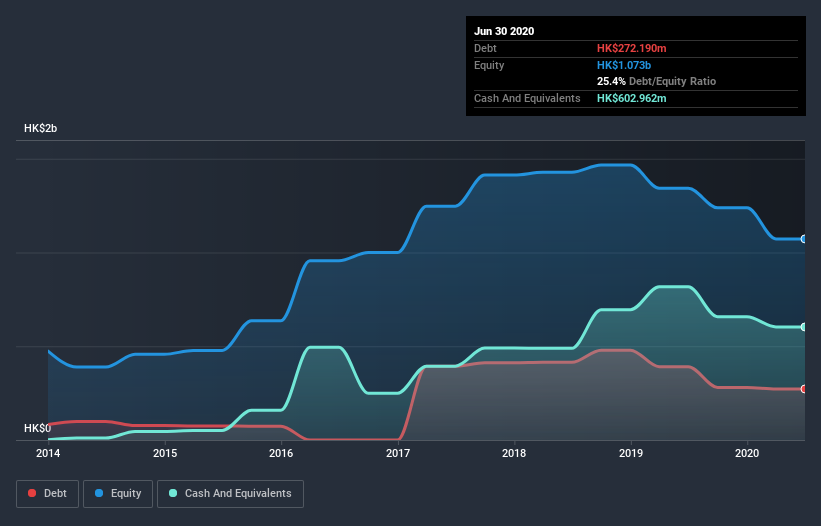Some say volatility, rather than debt, is the best way to think about risk as an investor, but Warren Buffett famously said that 'Volatility is far from synonymous with risk.' So it seems the smart money knows that debt - which is usually involved in bankruptcies - is a very important factor, when you assess how risky a company is. We note that Applied Development Holdings Limited (HKG:519) does have debt on its balance sheet. But should shareholders be worried about its use of debt?
When Is Debt Dangerous?
Generally speaking, debt only becomes a real problem when a company can't easily pay it off, either by raising capital or with its own cash flow. In the worst case scenario, a company can go bankrupt if it cannot pay its creditors. However, a more frequent (but still costly) occurrence is where a company must issue shares at bargain-basement prices, permanently diluting shareholders, just to shore up its balance sheet. Of course, the upside of debt is that it often represents cheap capital, especially when it replaces dilution in a company with the ability to reinvest at high rates of return. When we think about a company's use of debt, we first look at cash and debt together.
View our latest analysis for Applied Development Holdings
What Is Applied Development Holdings's Net Debt?
The image below, which you can click on for greater detail, shows that Applied Development Holdings had debt of HK$272.2m at the end of June 2020, a reduction from HK$390.8m over a year. However, it does have HK$603.0m in cash offsetting this, leading to net cash of HK$330.8m.

A Look At Applied Development Holdings's Liabilities
According to the last reported balance sheet, Applied Development Holdings had liabilities of HK$720.4m due within 12 months, and liabilities of HK$96.3m due beyond 12 months. Offsetting these obligations, it had cash of HK$603.0m as well as receivables valued at HK$13.7m due within 12 months. So it has liabilities totalling HK$200.1m more than its cash and near-term receivables, combined.
While this might seem like a lot, it is not so bad since Applied Development Holdings has a market capitalization of HK$501.0m, and so it could probably strengthen its balance sheet by raising capital if it needed to. However, it is still worthwhile taking a close look at its ability to pay off debt. Despite its noteworthy liabilities, Applied Development Holdings boasts net cash, so it's fair to say it does not have a heavy debt load! When analysing debt levels, the balance sheet is the obvious place to start. But you can't view debt in total isolation; since Applied Development Holdings will need earnings to service that debt. So when considering debt, it's definitely worth looking at the earnings trend. Click here for an interactive snapshot.
Given it has no significant operating revenue at the moment, shareholders will be hoping Applied Development Holdings can make progress and gain better traction for the business, before it runs low on cash.
So How Risky Is Applied Development Holdings?
We have no doubt that loss making companies are, in general, riskier than profitable ones. And the fact is that over the last twelve months Applied Development Holdings lost money at the earnings before interest and tax (EBIT) line. Indeed, in that time it burnt through HK$27m of cash and made a loss of HK$255m. Given it only has net cash of HK$330.8m, the company may need to raise more capital if it doesn't reach break-even soon. Summing up, we're a little skeptical of this one, as it seems fairly risky in the absence of free cashflow. When analysing debt levels, the balance sheet is the obvious place to start. However, not all investment risk resides within the balance sheet - far from it. Take risks, for example - Applied Development Holdings has 2 warning signs (and 1 which is concerning) we think you should know about.
Of course, if you're the type of investor who prefers buying stocks without the burden of debt, then don't hesitate to discover our exclusive list of net cash growth stocks, today.
If you decide to trade Applied Development Holdings, use the lowest-cost* platform that is rated #1 Overall by Barron’s, Interactive Brokers. Trade stocks, options, futures, forex, bonds and funds on 135 markets, all from a single integrated account. Promoted
Valuation is complex, but we're here to simplify it.
Discover if Novautek Technologies Group might be undervalued or overvalued with our detailed analysis, featuring fair value estimates, potential risks, dividends, insider trades, and its financial condition.
Access Free AnalysisThis article by Simply Wall St is general in nature. It does not constitute a recommendation to buy or sell any stock, and does not take account of your objectives, or your financial situation. We aim to bring you long-term focused analysis driven by fundamental data. Note that our analysis may not factor in the latest price-sensitive company announcements or qualitative material. Simply Wall St has no position in any stocks mentioned.
*Interactive Brokers Rated Lowest Cost Broker by StockBrokers.com Annual Online Review 2020
Have feedback on this article? Concerned about the content? Get in touch with us directly. Alternatively, email editorial-team@simplywallst.com.
About SEHK:519
Novautek Technologies Group
An investment holding company, engages in resort and property development, and property investment activities in the People’s Republic of China, Hong Kong, the Middle East, and Southeast Asia.
Adequate balance sheet with slight risk.
Market Insights
Community Narratives



